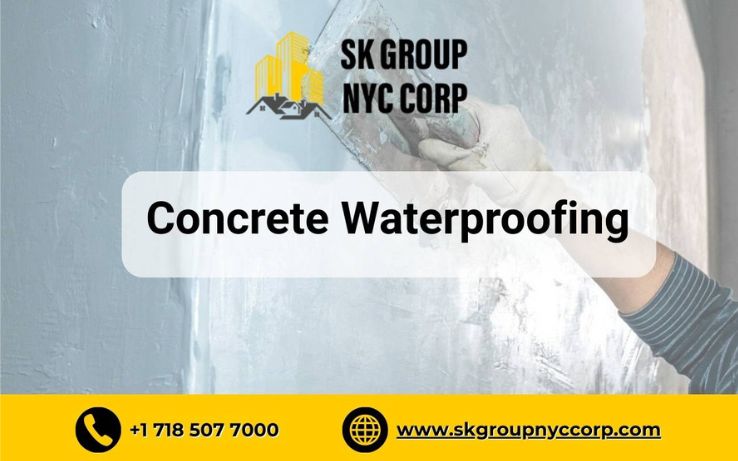Concrete is strong and durable but not naturally waterproof. Water easily slips into its tiny pores and cracks, leading to damage, mold, and even structural issues over time. That’s why waterproof concrete is essential for protecting your home.
At SK Group NYC Corp, we help homeowners turn regular concrete into waterproof concrete using high-quality sealers, coatings, and membrane systems. This keeps surfaces dry, strong, and long-lasting.
In this guide, we’ll explain how waterproof concrete works, why it matters, and the best waterproofing methods for NYC homes.
Why Concrete Needs Waterproofing
Concrete may look solid, but it’s actually porous. Those tiny holes absorb water, which leads to:
- Cracks forming inside the concrete
- Mold growth behind walls
- Rusting of internal steel bars
- Slippery and damaged floors
I once had a small patio that cracked within six months because it wasn’t waterproofed. Rainwater destroyed it slowly proof that skipping waterproofing is expensive later.
So, Can You Make Concrete Waterproof?
Yes absolutely!
You can turn regular concrete into waterproof concrete using the right products and techniques. Waterproofing creates a strong barrier that keeps water out and protects your structure for years.
How Waterproof Concrete Works
Here are the most common methods:
1. Surface Sealing
Liquid sealers are rolled or sprayed over the concrete. They create a protective shield that blocks water. Perfect for driveways, patios, walkways, and basements.
2. Crystalline Waterproofing
This goes deep into concrete pores and forms waterproof crystals inside. When water enters, it hits a wall of crystals and can’t pass through. Great for basements, foundations, and retaining walls.
3. Membrane Waterproofing
This method acts like a waterproof raincoat. A membrane sheet is applied to the concrete surface to stop water completely. Ideal for rooftops, balconies, and high-moisture areas.
Where You Should Use Waterproof Concrete
In a city like NYC where snow, rain, and humidity are high almost every concrete area benefits from waterproofing.
Common areas that should be treated:
- Basement walls and floors
- Concrete driveways
- Sidewalks and walkways
- Parking decks and garages
- Retaining walls
- Concrete rooftops and balconies
NYC’s weather is tough. I’ve seen unprotected sidewalks crumble in winter and basements flood after one heavy rain. Making concrete waterproof is not optional it’s necessary.
Benefits of Waterproof Concrete
Waterproofing gives you:
- Long-lasting concrete (up to 60% longer life)
- Protection from mold and mildew
- Better indoor air quality
- Fewer repairs and lower maintenance
- Higher property value
And the biggest benefit? Peace of mind.
Waterproof Concrete vs. Regular Concrete
| Feature | Waterproof Concrete | Unprotected Concrete |
|---|---|---|
| Lifespan | 40+ years | 15–20 years |
| Mold Risk | Very low | High |
| Maintenance | Minimal | Expensive |
| Appearance | Clean & smooth | Cracks & stains |
| Air Quality | Healthy | Musty smell |
Why choose damage and repairs when prevention costs less?
Important Stats You Should Know
- Waterproofing reduces water absorption by up to 90%
- Over 50% of concrete damage comes from water
- Waterproofed basements increase property value by 20%
I’ve seen these results firsthand in dozens of NYC projects.
My Personal Tip: Don’t Wait
Water damage starts small but spreads fast.
I’ve met clients who ignored a tiny crack and later paid thousands for foundation repair. Waterproof concrete early to save money later.
How to Choose the Right Waterproofing Method
Here’s what we recommend:
- Basements: Crystalline or liquid sealers
- Roofs & balconies: Membrane waterproofing
- Outdoor slabs: Hydrophobic sealers or coatings
Still confused? That’s normal waterproofing depends on your structure and environment.
Need Waterproof Concrete in NYC?
SK Group NYC Corp offers trusted waterproofing services across New York.
We use premium materials and proven techniques to create long-lasting waterproof concrete for your property.
Our team protects homes in:
Manhattan • Brooklyn • Queens • Bronx • Staten Island
Final Thoughts: Is Waterproof Concrete Worth It?
Yes 100% worth it.
If you want stronger concrete, fewer repairs, cleaner air, and a safer home, waterproofing is the smartest choice.
And if you’re in NYC, you already know who to call SK Group NYC Corp.
We provide concrete waterproofing, repair, and installation services designed to last through harsh weather and daily wear.
Have Questions? Call Us Now!
+1 (718) 507-7000
We’re here to help quick answers, friendly service, anytime you need!
Contact SK Group NYC
🌐 Website: www.skgroupnyccorp.com
📍 Serving: Manhattan, Brooklyn, Queens, The Bronx, and Staten Island
📍 Address: 87-88 172nd St, Jamaica, New York, NY, United States, New York

